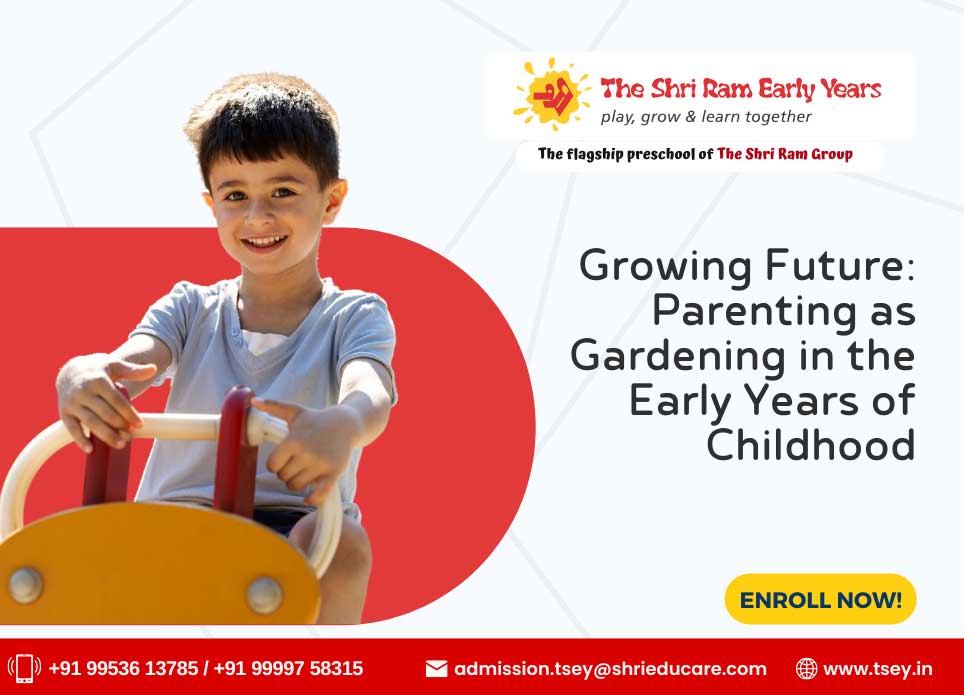
It’s a silent moment every parent goes through. It’s when your child sees a butterfly and chases it, arms stretched out, eyes wide, laughing. It’s in that moment, you’re not simply observing them pursuing joy – you’re watching a mind at work, a world reawakening. That moment – soft, quick, but full of impact – feels like seeing a seed germinate for the first time.
And that’s what early childhood is, too: a garden in bloom.
Parenting during these years? You’re the gardener. The soil, the sun, the gentle hands who guided them to grow. And as with any good garden, what you plant today reverberates into tomorrow.
The Garden Needs Time
In this era of “early everything” – everything is delivered earlier, “warehouses in boxes” are built early, food is ready early – it’s easy to fall into the trap of rushing. So, it was early math, early reading, early milestones. But standing over a garden with a stopwatch won’t make it bloom faster. It does bloom because the circumstances are right – someone cared enough to nurture the roots.
When we are obsessed with what our kids can do rather than how they feel while doing it, we lose the richness of childhood. We forget patience is power, exploration is learning, and sometimes mud-streaked clothes and messy hands are a reflection of a day well-lived.
Curiosity Is the Sunlight
Have you ever had a “why” question stump you from the back seat of your car? “Why don’t clouds fall down?” “Why do ants follow one another?” That’s sunlight shining through. Curiosity is nature’s way of saying, “Hey, I’m ready to grow.”
The optimal early childhood settings do not stifle that light with fixed answers. Instead they mirror it – reflecting and reassuring the child’s curiosity, with more questions, more wonder, more opportunity to discover.
He demands answers, even in pre nursery admission in Gurgaon or anywhere, but he also craves curiosity. One that doesn’t demand your child be anything other than who they are – explorers, question-askers, joy-chasers.
Safe Soil Is Everything
Reflect on the adults who had an impact on your life. The ones who made you feel engaged. Heard. Safe. Those are the kind of people whose words stick in your head long past the time you’ve matured.
Children are no different. They flourish in spaces where they are seen as individuals, where their feelings matter, where safety is less about physicality and more absolute about emotion. It’s not that you can’t have a program that is obvious and structured, but the early childhood spaces should feel like rich, nurturing soil. The kind that says, “You belong here,” no matter how your child’s day is going.
If you are looking for nursery admission in Gurgaon, ask this question – “Will this place see my child? Not just as a student, but as a full human being?”
Growth isn’t Always Visible
Here’s the thing about gardens: not all growth is above ground.
A child’s brain is making connections in ways we don’t always see. The toddler who spends an hour stacking blocks? They’re also learning persistence, spatial reasoning, even early math. The guy who pretends to be a teacher or a dinosaur? They are working on empathy, power, imagination.
We’re often loud in our congratulations for the visible milestones – counting to 10, writing their name, saying “please” and “thank you.” But let’s not forget the invisible victories: recovering from a tantrum, sharing a favored toy out of the blue, asking for help when they need it.
Those are roots. And they run deep.
The Weeds Are Part of It Too
Even the most meticulously curated garden will sprout the occasional weed. A tough morning. A meltdown. A “no” when you so desperately need a “yes.” That’s not failure – it’s growth.
Let’s normalize it.
Let’s not expect little humans to behaviorally function like big ones. Let’s allow them the room to be messy, emotional, unpredictable. Because, after all, every hard moment is also a teaching moment – an opportunity to connect, to co-regulate, to model “the world we want them to live in.
Rather than, “How do I correct this behavior?,” we might ask, “What message is this behavior trying to convey?”
Not Just Raising a Child; Raising a Person
In the head-spinning world of schools and parenting books and developmental checklists, we sometimes forget this profound truth:
You’re not raising a test-taker, or a prodigy, or a trophy.You’re developing someone’s future friend, partner, teammate, listener, thinker, citizen. What you do in these first few years isn’t simply about getting your child ahead. But its a heart start for them. That means modeling kindness. Allowing slowness. Choosing joy. And understanding that who they are is more important than what they do.
Final Thought: It Takes a Village and an Idea
No gardener works alone. You may plant the seeds, but the sunlight, air, and water are what helps them flourish.
The selection process for the right early learning space is not check-marking. It’s about finding partners who see your child as you do. Who think childhood is sacred. Who knows that real education is not pushed or pressured – it is invited and nurtured.
Which brings us to one such space, The Shri Ram Early Years (TSEY). Inspired by the Reggio Emilia approach, TSEY is not just any preschool; it’s a thoughtfully curated garden where children are free to wonder, explore, and grow. So, if pre-nursery or nursery admissions in Gurgaon is on your mind and you are looking for a space that inculcates not only academic readiness, but also emotional well-being, curiosity and confidence – TSEY is well-worth a visit!
Because when childhood is a garden, every child is a miracle in motion. And you? You’re not just the parent. You’re the gardener. The keeper of wonders. The one who gets to say – “I watched you grow.”






